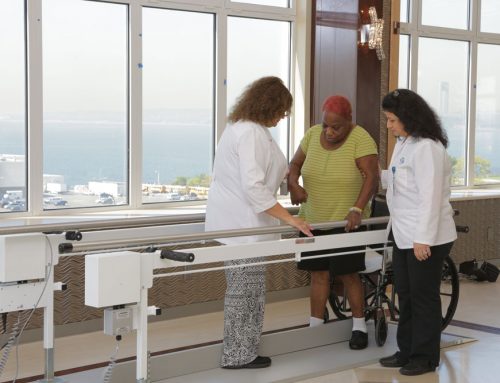Helping Dementia Patients can be a difficult task. Behavior changes, memory problems, extreme irritability, and even aggression are symptoms of this disease. So, it’s absolutely crucial that these patients get dementia care or people caring for them learn to manage the symptoms.
Haym Salomon Home for Nursing & Rehabilitation in Brooklyn welcomes dementia patients, and treats them as one of the family. We are very experienced at assisting, treating and helping dementia patients.
See our tips below – they do help!
1. Be affectionate and ready with a smile
Dementia patients often get confused or frustrated. You can help by always being kind and caring, and reassuring them. Sometimes they imagine things that never happened. Don’t try to tell them they are mistaken. Rather, respond by being supportive.

In addition, reassure them, say something nice to them, hold their hand, or even give them a little hug. Reminisce and empathize
Get them to reminisce and remember “the good old days”. This helps affirm who they are, and can calm them down. Asking questions about a person’s childhood or school days can often evoke some positive and thoughtful responses. All these are necessary when helping dementia patients.
2. Stay positive
Maintaining a sense of humor is tremendously beneficial to care-giver and patient alike.
People notice your physical appearance: your demeanor, attire, and body language. These things communicate your feelings and thoughts even more than words. Speak to your loved one with respect and in a kind way so that they feel valued.
Be mindful of your tone of voice and verbal and facial expressions. Appropriate physical touching can also be an important means of communication.
3. Limit distractions when helping dementia patients
Try to talk to your loved one in a quiet place, without distractions. If necessary, turn off the TV or radio, or close the door to try to get the person’s undivided attention.
If your loved one is angry or upset, try to connect with them on an emotional level. Try something different—perhaps move to another place.
Call the person by their first name and gently explain who you are and what you’re doing.
Helping dementia patients requires speaking clearly and slowly—and try to maintain eye contact as much as possible. It’s often a good idea to sit down next to your loved one so that you are at the same level.
4. Use short sentences
Speak clearly and try to be kind and reassuring. Don’t shout, and try to keep your voice steady. Be ready to repeat your message/s several times and listen carefully to the response. Use the names of people, places and things instead of using pronouns. Avoid jargon and acronyms. If you cannot get through to the dementia sufferer, be patient and try again using slightly different words and phrases.
5. Ask simple questions
Open-ended questions can be difficult to answer for the dementia sufferer. They can also get confused if you offer them different options. Ask questions which can be replied to simply, with a `yes’ or a `no’. Use diagrams, pictures and gestures to clarify your question.
6. Observe their facial expressions
Be patient and observant when helping dementia patients. Be prepared to wait for the answer and/or make suggestions if your loved one is struggling to find the right words. Observe how your interlocutor is reacting to what you say, and note their body language and demeanor. Try to work out how they are feeling, and tune into them on an emotional level.
Please don’t hesitate to contact us or walk in to see how we treat our dementia patients. Feel free to ask us any questions you may have concerning caring for dementia patients.
This content comprises informative and educational resources only and can not be considered as a substitute for professional health or medical guidance. Reliance on any information provided in this article is solely at your own risk. If you have any inquiries or apprehensions about your medical condition or health goals, talk with a licensed physician or healthcare provider.






Leave A Comment